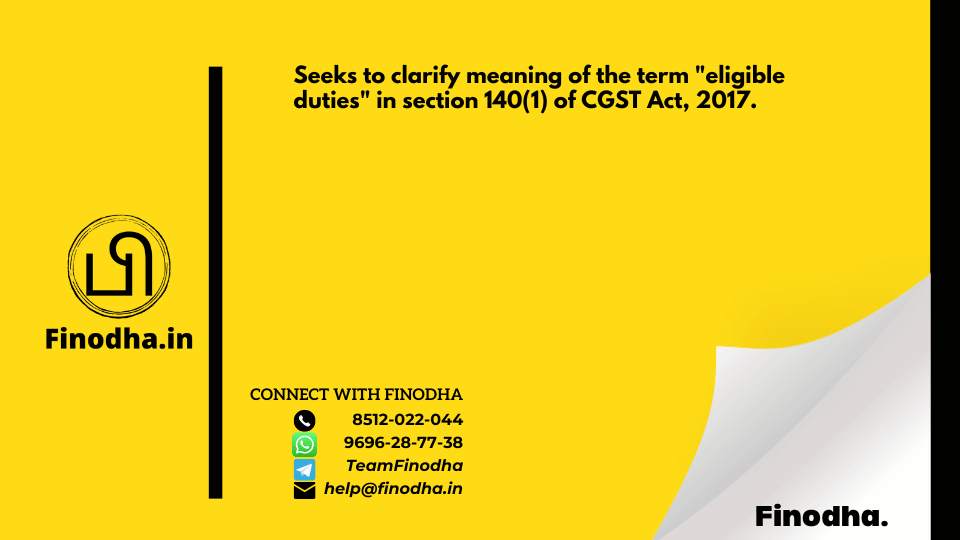Important Keyword: F. No. 267/80/2018-CX.8, Circular No. 87/06/2019-GST, Section 28(a) CGST Act 2018, section 140(1) CGST Act 2017, section 168 CGST Act, section 66B Finance Act 1994, section 3(1) Customs Tariff Act 1975, section 28(d) CGST Act 2018.
F. No. 267/80/2018-CX.8
Government of India
Ministry of Finance
Department of Revenue
Central Board of Indirect Taxes and Customs
New Delhi, the 2nd Jan, 2019
Circular No. 87/06/2019 – GST
Table of Contents
To
The Principal Chief Commissioners/Chief Commissioners/ Principal Commissioners/ Commissioner of Central Tax (All)
The Principal Director Generals/ Director Generals (All)
Madam/ Sir,
Sub: Central Goods and Services Tax (Amendment) Act, 2018- Clarification regarding section 140(1) of the CGST Act, 2017-reg.
Attention is invited to sub-section (a) of section 28 of the CGST (Amendment) Act, 2018 (No. 31 of 2018) which provides that section 140(1) of the CGST Act, 2017 be amended with retrospective effect to allow transition of CENVAT credit under the existing law viz. Central Excise and Service Tax law, only in respect of “eligible duties”. In this regard, doubts have been expressed as to whether the expression “eligible duties” would include CENVAT credit of Service Tax within its scope or not.
2. Therefore, in exercise of powers conferred under section 168 of the Central Goods and Services Act (hereinafter referred to as “Act”), for the purposes of uniformity in the implementation of the Act, the Central Board of Indirect Taxes and Customs hereby directs the following:
3.1 The CENVAT credit of service tax paid under section 66B of the Finance Act, 1994 was available as transitional credit under section 140(1) of the CGST Act and that legal position has not changed due to amendment of section 140(1) on account of following reasons:
- The amendment in provisions of section 140(1) and the explanations to section 140 need to be read harmoniously such that neither any provision of the amendment becomes otiose nor does the legislative intent of the amendment get defeated.
- The intention behind the amendment of section 140(1) to include the expression “eligible duties” has been indicated in the “Rationale/ Remarks” column (at Sl. No. 37) of the draft proposals for amending the GST law which was uploaded in the public domain for comments. It is clear that the transition of credit of taxes paid under section 66B of the Finance Act, 1994 was never intended to be disallowed under section 140(1) and therefore no such remark was present in the document.
- Under tax statutes, the word “duties” is used interchangeably with the word “taxes” and in the present context, the two words should not be read in a disharmonious manner.
3.2 Thus, expression “eligible duties” in section 140(1) which are allowed to be transitioned would cover within its fold the duties which are listed as “eligible duties” at sl. no. (i) to (vii) of explanation 1, and “eligible duties and taxes” at sl. no. (i) to (viii) of explanation 2 to section 140, since the expression “eligible duties and taxes” has not been used elsewhere in the Act.
3.3 The expression “eligible duties” under section 140(1) does not in any way refer to the condition regarding goods in stock as referred to in Explanation 1 to section 140 or to the condition regarding inputs and input services in transit, as referred to in Explanation 2 to section 140.
4. Further, it has been decided not to notify the clause (i) of sub-section (b) of section 28 and clause (i) of sub-section (c) of section 28 of CGST (Amendment) Act, 2018 which link Explanation 1 and Explanation 2 of section 140 to section 140(1). This would ensure that the credit allowed to be transitioned under section 140(1) is not linked to credit of goods in stock, as provided under Explanation 1, and credit of goods and services in transit, as provided under Explanation 2. However, the duties and taxes for which transition is allowed shall be governed by para 3.2 above.
5. No transition of credit of cesses, including cess which is collected as additional duty of customs under sub-section (1) of section 3 of the Customs Tariff Act, 1975, would be allowed in terms of Explanation 3 to section 140, inserted vide sub-section (d) of section 28 of CGST Amendment Act, 2018 which shall become effective from the date the same is notified giving it retrospective effect.
6. Trade may be suitably informed and difficulty, if any, in the implementation of this circular may be brought to the notice of the Board.
Yours faithfully,
(KUMAR VIVEK)
OSD (CX.3/8)
Download Pdf: https://taxinformation.cbic.gov.in/




